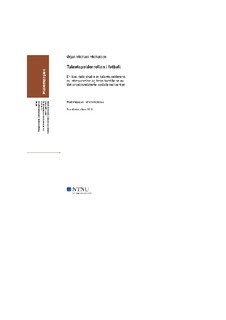| dc.description.abstract | Introduction: This study uses traditional social network theory, focusing on the strength of weak ties, structural holes and the small world phenomenon, to try to understand the soccer scout’s role description and work-related social network. In this study, the soccer scout is limited to the talent scout. The talent scouts’ primary objective is to identify players any club wishes to register. Studies regarding talent scouts and social network theory are seemingly scarce. Previous studies in the field of talent identification focus largely on preferable attributes and skills possessed by young players. Other studies concentrate on which abilities and attitudes talent scouts rank as valuable, while many highlight the relative age effect.
Theory: Social network theory explores the characteristics of relations between participants, whereas the strength of weak ties outlines the significance of relations influenced by inequalities. Structural holes refer to the potential relationship between two parties often in two different social focuses, and the values of establishing this relationship. The small-world phenomenon offers insight that our social network, in theory, is much larger than first assumed, due to the systematizing of frequently experiences of coincidences.
Method: Five semi-structured interviews were conducted with five different soccer scouts on a national and international level in Norway, with the purpose of identifying the scouts´ role description and key aspects of their work-related social network.
Analysis: The scouting role can be divided into four minor tasks. 1) The role where they identify the players who are good at the time, 2) the role where they identify the players development, 3) the role that justifies the scouts’ actions towards a player, and 4) the role where they identify senior players. In light of social network theory, there are five findings that stands out. 1) The talent scouts social networks are imperative to all scouts. 2) The scouts’ willingness to broadcast information is affected by the competitiveness of other clubs. 3) Furthermore, the findings indicate that these scouts’ attention to their social networks is random and accidental. 4) All scouts underline the importance of observing the players live themselves, regardless of their references. 5) The level of perceived trust in others influences the scouts’ motivation of exchanging information. | nb_NO |
